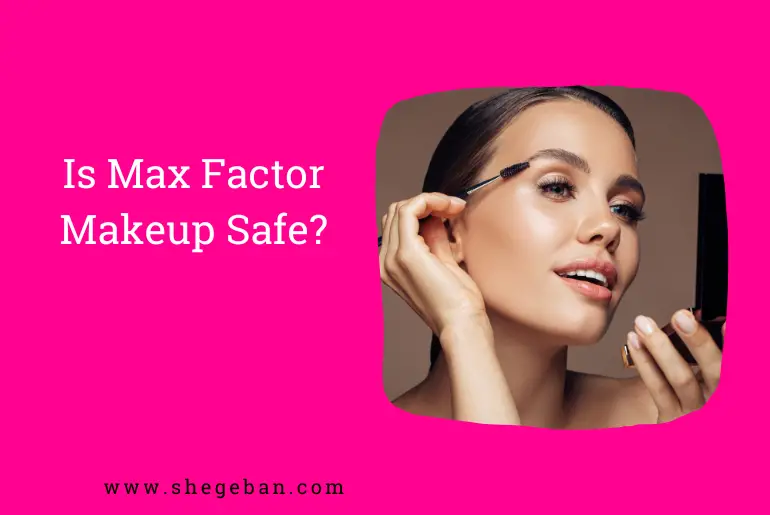If you’re someone who loves enhancing your eyes with makeup, it’s essential to be aware of the ingredients lurking in those beautiful little pots and tubes.
While eye makeup can make your eyes pop and add a touch of glamour to your look, some ingredients commonly found in these products can potentially harm your precious peepers.
This post will shed light on the harmful eye makeup ingredients you should avoid. From parabens to fragrances, formaldehyde-releasing preservatives to heavy metals, I will uncover the risks associated with these ingredients
10 Eye Makeup Ingredients To Avoid
1. Parabens
These sneaky little preservatives might be lurking in your eye makeup. While they prevent bacterial growth, they can also mess with your hormones and cause allergic reactions.
Watch out for words like “methylparaben” or “propylparaben” on ingredient lists and opt for paraben-free alternatives.
2. Fragrances
Who doesn’t love a pleasant scent? Well, your eyes might not agree. Fragrances in eye makeup can lead to irritation and allergic reactions, especially for those with sensitive eyes. Look for fragrance-free options to keep your eyes happy.
3. Formaldehyde-releasing preservatives
These preservatives slowly release formaldehyde, a potential carcinogen, to keep your eye makeup fresh. But let’s be honest; nobody wants that near their eyes. Avoid products with formaldehyde-releasing preservatives to play it safe.
4. Coal tar and color additives
Beware of these troublemakers in your eye makeup. Coal tar in mascaras and eyeliners can be linked to cancer risks. Some color additives can also cause allergic reactions. Check for coal tar-free and color additive-free options for healthier eyes.
5. Heavy metals (lead, mercury, etc.)
Your eyes deserve better than heavy metals. Lead and mercury, sometimes found in eye makeup, can harm your vision and cause eye irritation. Keep an eye out for products without heavy metals to protect your peepers.
6. Talc
Talc is a common ingredient found in eyeshadows and powders, known for its silky texture. However, it can potentially contain asbestos fibers, which are harmful when inhaled or if they come into contact with the eyes. Look for talc-free eye makeup products for safer alternatives.
7. Phthalates
These sneaky chemicals are often used to increase the flexibility and durability of certain eye makeup products. However, they have been associated with hormonal disruption and can potentially harm the reproductive system. Opt for phthalate-free options to protect your health.
8. Bismuth oxychloride
While it adds a beautiful shimmer to some eye makeup products, bismuth oxychloride can be a troublemaker for sensitive eyes. It may cause irritation, itching, or redness. Look for eye makeup without this ingredient if you have sensitive eyes.
9. Petroleum-based ingredients
Petroleum-derived ingredients like mineral oil and petrolatum are emollients commonly used in eye makeup. However, they can clog pores and potentially lead to eye irritation or acne. Choose products that use natural and nourishing alternatives like plant oils instead.
10. Retinyl palmitate
This form of vitamin A is sometimes found in eye makeup, especially in eyeshadows. However, when exposed to sunlight, it can break down and release free radicals, which may damage the skin and eyes. Consider avoiding eye makeup products that contain retinyl palmitate.
5 Effects of Harmful Eye Makeup
Harmful ingredients in eye makeup can negatively affect the eyes and the surrounding skin. Let’s take a closer look at the specific effects of these ingredients:
1. Eye irritation
Many harmful ingredients can cause eye irritation, leading to redness, itching, and discomfort. This can be particularly problematic for individuals with sensitive eyes or those prone to allergies.
2. Allergic reactions
Certain ingredients, such as parabens, fragrances, and color additives, have the potential to trigger allergic reactions in some individuals. Symptoms may include swelling, itching, and inflammation of the eyes.
3. Hormonal disruption
Some ingredients, like certain preservatives, have been linked to hormonal disruption. While the direct impact on the eyes may not be immediate, long-term exposure to such ingredients could potentially lead to adverse effects on overall hormonal health.
4. Sensitivity and sensitization
Continuous exposure to harmful ingredients can sensitize the eyes over time, making them more prone to irritation and reactions even with minimal contact.
5. Long-term health risks
Certain ingredients, such as coal tar and heavy metals like lead and mercury, carry potential long-term health risks. These substances may have carcinogenic properties or cause damage to the optic nerve, leading to vision problems or other serious eye conditions.
Which Ingredients Are Best for Eye Makeup?
Opt for eye makeup that contains ingredients such as vitamin E, and argan oil. Both are known for their antioxidant properties that help protect delicate skin, nourish and hydrate the skin, promoting a smooth and supple appearance.
7 Tips for Choosing Safe Eye Makeup Products
1. Read product labels and ingredient lists
Take a moment to read eye makeup products’ labels and ingredient lists. Look for products that clearly list the ingredients and avoid those with harmful substances like parabens, fragrances, formaldehyde-releasing preservatives, retinyl palmitate, etc.
2. Research brands and their commitment to safety
Before purchasing eye makeup, do a little research on the brands you’re interested in. Look for brands that prioritize safety, and transparency, and use high-quality ingredients.
Check if they follow strict manufacturing practices and have certifications or endorsements from trusted organizations.
3. Seek out natural and organic options
Consider opting for natural and organic eye makeup products. These products are often formulated with plant-based ingredients and free from harmful chemicals, making them gentler on the delicate eye area.
Look for certifications such as “USDA Organic” or “Certified Natural” to ensure the authenticity of the product.
4. Check for certifications or endorsements
Look for eye makeup products that carry certifications or endorsements from reputable organizations. Certifications such as “Cruelty-Free” or “Vegan” ensure that the products are not tested on animals and do not contain animal-derived ingredients.
Also, endorsements from dermatologists or ophthalmologists provide added assurance of safety.
5. Consider patch testing
If you have sensitive skin or eyes, consider performing a patch test before applying new eye makeup products. Apply a small amount of the product to a discreet area of your skin, such as the inner forearm, and observe for any adverse reactions or allergies over 24-48 hours.
6. Pay attention to expiration dates
Just like any other cosmetic product, eye makeup has a shelf life. Pay attention to expiration dates and discard any products that have expired. Using expired eye makeup can increase the risk of eye infections or irritation.
7. Trust your instincts
Finally, trust your instincts and listen to your body. If a particular eye makeup product causes discomfort, irritation, or adverse reactions, discontinue immediately. Everyone’s skin is unique, so what works for others may not work for you
Conclusion
As you embark on your journey of choosing safe eye makeup products, keep in mind that it’s not just about enhancing your beauty but also protecting and caring for your eyes.
With the right knowledge and choices, you can confidently rock those eye-catching looks without compromising your eye’s well-being.
Remember to read product labels, research brands, and seek out natural and organic options. Pay attention to certifications, perform patch tests if needed, and trust your instincts.
Your eyes deserve the best, so prioritize safety, quality, and your overall eye health. I hope this article was helpful and you will make a better choice when next you are shopping for your eye makeup products.







